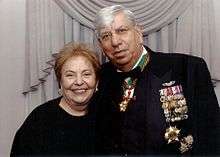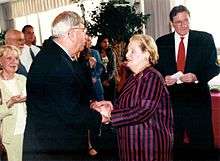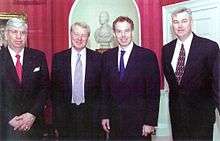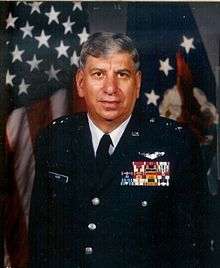Jacques Paul Klein
Jacques Paul Klein is a retired United States diplomat, who served as head of three United Nations peacekeeping missions.

Background
Jacques Paul Klein was born on 9 January 1939 in Sélestat, Alsace, France, the son of Jean Paul Klein and Josephine Klein (née Wolff). In the Middle Ages the seat of the Klein family was located in Wuille (Ville) in the Vosges Mountains. Barthel Klein and his descendants were Mayors, Municipal Magistrates and City Counselors in Ville. In 1695, after the Thirty Years' War, Jean Klein married Catherine Bleicher from nearly St. Hippolyte (St.Pilt) and after their marriage moved the family there, They became vintners after arriving in St. Hippolyte and have practiced viniculture since that time. After the death of Mr. Klein's father and the destruction of the family home and business at the end of World War II, his mother opted to move to the United States with her seven-year-old son, arriving on December 7, 1946. Prior to leaving France, Mr. Klein had begun his elementary school studies at College Koeberle in Selestat.
In recognition of Mr. Klein's service to peace he has been awarded an Honorary Degree of Doctor of Law by Elmhurst College and an Honorary Degree of Doctor of Humane Letters, Honoris Causa by Roosevelt University. In 1997 he was presented with a Certificate of Appreciation and the Seal of the City of Osijek and in 1998 The Charter of Gratitude by the President of the Republic of Croatia. In 2003 He was named an Honorary Citizen of the City of Vukovar. In recognition of his commitment to international understanding and reconciliation, he was presented the 2010 Marcel Rudloff Prize at the Court of Human Rights in Strasbourg for “service de la defense de l'esprit de tolerance.” In 2011 he was awarded the degree of Doctor Honoris Causa by Jospi Juraj Strossmayer University, the Certificate of Gratitude by the Association of Returnees of Croatia and the Distinguished Global Leadership Award by the Evandeoski Teoloski Fakultet in Osijek, Croatia, “for being a transformational leader who demonstrated clarity of vision, moral conviction and the political will while championing human rights and the development of democracy in Croatia, BosniaHerzegovina and Liberia. “ In 2013 he was also made an honorary Citizen of the City of Osijek.

Despite these many accolades Klein's reputation is tarnished by accusation that UN staff in his command were involved in sex trafficking during the UN missions in Bosnia.
http://www.telegraph.co.uk/culture/film/9041974/What-the-UN-Doesnt-Want-You-to-Know.html
In August, 1968, Mr. Klein married Dr. Margrete (Gretchen) Siebert Klein. She holds a Bachelor of Science degree in Mathematics, from Baldwin Wallace University in Berea, Ohio, a Master of Science degree in Physics, and a Ph.D. in Science Education from Northwestern University in Evanston, Illinois. She pursued a professional career as a college instructor and subsequently served as a Staff Associate in the Division of Physics and as a Program Director at the National Science Foundation in Arlington, Virginia. They have two children, Christian and Maia, and four grandchildren, Nikolas, Sophia, Caroline and Courtenay.
State Department Career
Mr. Klein took the Department of State Foreign Service Examination in June 1969 and entered the Foreign Service in 1971. He served his initial tour of duty in the Operations Center of the Executive Secretariat, Office of the Secretary of State. He was subsequently posted abroad to serve as Consular Officer at the American Consulate General in Bremen, Federal Republic of Germany. In 1973, he was reassigned to the Department of State as a Political Officer in the Office of Southern European Affairs. He returned overseas in 1975 upon assumption of diplomatic relations with the German Democratic Republic, to serve as Consular Officer in the newly opened American Embassy in Berlin. In 1977, he was reassigned and served a follow-on tour as a Political Officer at the American Embassy in Bonn.
Mr. Klein was selected to attend the National War College in 1979. After graduation, he was assigned as a Management Analysis Officer on the Policy Planning Staff in the Office of the Director General of the Foreign Service. He was seconded to the United States Department of Defense in 1982 to serve as Senior Adviser for International Affairs to the Secretary of the Air Force, with the rank of Deputy Assistant Secretary. He then returned to the Department of State to become Director of the Office of Strategic Technology Matters in the Bureau of Politico-Military Affairs. In 1989, he was again recalled to the Department of Defense to serve as Assistant Deputy Under-Secretary of the Air Force for International Affairs.
In 1990, Mr. Klein returned to the Department of State to serve as Principal Adviser to the Director General of the Foreign Service, and Director of Personnel for Career Development, Training and Detail Assignments. He returned abroad in 1993 to serve as Political Adviser to the Commander-in-Chief of the United States European Command in Stuttgart, Germany.
In 1996, United Nations Secretary-General Boutros Boutros-Ghali selected him to serve as Transitional Administrator for Eastern Slavonia, Baranja and Western Sirmium (UNTAES), with the rank of Undersecretary General. As Chief of Mission, he had overall command and control responsibilities and day-to-day management authority of a multinational force of 5,000 military personnel, 350 international civilian police officers, 100 multi-national military observers, 300 international civil servants and a local national staff of 600. He administered a $370 million budget and, through skillful management, reduced actual expenditures by over $20 million per year. Mr. Klein forged a united and effective team including personnel from 28 different countries. They planned and executed the dangerous and complex demobilization of over 17,000 Serb troops, including several criminal paramilitary units, and successfully demilitarized the region, and seized the vital Djeletovci Oil Field controlled by Arkan’s paramilitary thugs, known as the Scorpions and returned them to Croatian government control.[1] His mission negotiated a comprehensive structure of minority rights and guarantees for the local population, held successful municipal elections for 150,000 voters and facilitated the return of over 100,000 displaced persons to the region. In conjunction with the International Criminal Court, they located, detained and arrested the first war criminal, under sealed indictment, in the former Yugoslavia. During the two-year U.N. mandate, Mr. Klein facilitated the return of the demilitarized region to Croatian national sovereignty. In 2011 he received the Certificate of Gratitude from the Association of Returnees of Croatia for his role in facilitating the return of over 200,00 Croatian returnees to their homes, leaving only some 400 who have yet to return.

In January 1998, the Government of the United States nominated and the Dayton Peace Implementation Council’s Steering Board approved the selection of Mr. Klein as Principal Deputy High Representative for Bosnia-Herzegovina (BiH), with the personal rank of Ambassador. As Principal Deputy High Representative in the senior international organization established by the Dayton Peace Accords, Mr. Klein had day-to-day management responsibility of the Office of the High Representative.

As Principal Deputy High Representative in the senior international organization established by the Dayton Peace Accords, Mr. Klein had day-to-day management responsibility of the Office of High Representative OHR. The OHR was composed of 436 diplomats and international civil servants from 22 different countries, had an annual budget of 32 million Euros and was headquartered in Sarajevo, BiH with nine constituent field offices located throughout the country. With his team, Mr. Klein successfully transformed the OHR from a dysfunctional, moribund, multinational construct into an organization with elan and engagement that quickly began producing impressive results. In quick succession, they moved to create a new state flag, the national anthem, and developed the convertible mark as the new currency backed one-to-one by the Deutsche Mark. OHR created a new national license plate that allowed for freedom of movement and anonymity, sidelined extremists and established all of the joint state and entity institutions envisioned by the Dayton Peace Accords.[2] These reforms facilitated a 35 percent growth in the economy. In addition, a return process was implemented which allowed over 400,000 internally displaced persons to begin returning home. Mr. Klein brokered multinational talks that allowed for the delineation of international borders of Bosnia-Herzegovina and coordinated aid and relief efforts made by the international community to help rebuild the country.

From 2001 through 2003, at the request of United Nations Secretary General Kofi Annan, Mr. Klein served as his Special Representative and Coordinator of the United Nations Mission in Bosnia and Herzegovina, with the rank of Under-Secretary-General. As Chief of Mission, he had overall management authority and day-to-day management responsibility of 2,700 international police officers from 46 different countries, 432 international diplomats and civil servants from 95 countries, and a local national staff of 1,400 members assigned to Sarajevo and seven regional offices in the country with a budget of $168.2 million. With his team, Mr. Klein successfully reformed, restructured and downsized a 44,000 pre-war police force to approximately 16,000 trained, vetted and equipped law enforcement personnel into ethnically integrated and accountable structures. They created the most comprehensive anti-trafficking program in Southwestern Europe. The task force identified approximately 249 criminal establishments, conducted 855 raids and permanently closed more than 150 of them. In conjunction with the International Office of Migration, the task force repatriated over 250 women to their countries of origin. The Mission recruited and trained the first BiH police contingent that was deployed to the United Nations Mission in East Timor and the first group of United Nations military observers. He focused on combating international terrorism, illegal migration and organized crime and within eighteen months was able to cut the number of illegal persons entering BiH, through its three airports, from 25,000 to 300 per year.
In 2003 Officer Kathryn Bolkovac discovered a ring of human trafficking involving UN officers, after two young girls appeared after being sold and abused in illegal brothels. Dozens of girls began turning up with 'eerily similar’ stories: They’d taken a job abroad as a waitress or cleaner or nanny – often at the insistence of their own families – but during the journey everything had gone wrong. They were taken somewhere else altogether, forcibly stripped and sold to someone who humiliated, beat and raped them into dead-eyed submission. Now they were imprisoned in brothels in Bosnia. The UN mission in Bosnia finished in January 2003 but the abuses did not end there. Former Special Representative of the UN Secretary General (SRSG) in Bosnia, Jacques Paul Klein, under whose supervision the cases of human trafficking occurred, did not do anything to help Kathyrin Bolkovac and dismissed all her claims, alluding the abused girls were ´whores of war´and he was not going to change anything. In fact, Jacques Paul Klein, the head of the UN mission in Bosnia, went on to lead the UN mission in Liberia, where he presided over similar scandals.[3][4]
From 2003 through mid-2005, Mr. Klein served as the Special Representative of the Secretary General and Coordinator of United Nations Operations in Liberia. He led the largest United Nations Mission in the world, consisting of 15,000 military personnel, 1,115 international police officers, 215 military observers, 695 international diplomats and civil servants, 500 United Nations volunteers and 800 local staff with a budget of $800 million. Mr. Klein was tasked with reintegrating and rehabilitating ex-combatants, holding the first democratic elections in a quarter of a century, reforming and restructuring the security sector and the judicial system, and extending state authority throughout Liberia. During the two-year mandate, some 106,000 former combatants were demobilized, among them 11,000 child soldiers, and their weapons destroyed. Three-hundred fifty-thousand (350,000) refugees returned home from neighboring states, and about 450,000 internally displaced persons were assisted in returning to their homes. Six-hundred fifty-nine thousand (659,000) people were fed on a daily basis, and 1,400,000 children were immunized against measles and polio. Over 1,300,000 people were registered to vote in the first democratic election in modern Liberian history, electing the first female president in African history. Also, during this period, the security, legal and penal systems were vetted, restructured and reformed and Liberia’s land, sea and air assets were trained to secure it national borders.
Foreign Service Promotion History
| Grade | Date |
|---|---|
| Personal Rank of Ambassador | 1998 |
| Minister Counselor (FE-MC) | 1998 |
| Counselor (FE-OC) | 1991 |
| FSO-01 | 1984 |
| FSO-02 | 1981 |
| FSO-04 | 1980 |
| FSO-05 | 1975 |
| FSO-06 | 1973 |
| FSO-07 | 1971 |
| ||||||||||||
| ||||||||||||
| ||||||||||||||||
Air Force Career
Major General Klein completed the extension programs of the Industrial College of the Armed Forces, Air War College, Air Command and Staff College, and Squadron Officer School. He completed, in residence, the National War College in 1980, the National Security Management Course of the National Defense University in 1988, and the Program for Senior Executives in National and International Security, John F. Kennedy School of Government at Harvard University, in 1989.

General Klein was commissioned through Officer Training School, Lackland Air Force Base, Texas, in August 1963, and was assigned to the 366th Tactical Fighter Wing, Holloman Air Force Base, New Mexico, as Deputy Director of Personnel, and subsequently served as Chief of the Quality and Career Control Branches. In 1965, General Klein volunteered for service in South Vietnam and was assigned to Nha Trang Air Base to help activate the 14th Air Commando Wing. During that assignment, he earned his officer non-rated aircrew member wings flying intelligence, strike and reconnaissance missions in 0-1 Es with the 21st Tactical Air Support Squadron. While in Vietnam, he was selected for assignment to the 1005th Special Investigations Group. In 1966, he completed basic intelligence and specialized counterintelligence training in Washington, D.C. before being assigned as Deputy Chief of the Counterintelligence Division, Office of Special Investigations, District 2, in New York City.
In January 1968, upon release from active duty to resume graduate studies, General Klein accepted a reserve assignment with the Office of Special Investigations, District 24 in Chicago, Illinois. In 1969, he was asked to assume a civilian position as Chief of the Counterintelligence Division. This appointment necessitated his reassignment as an Intelligence Officer to the 1127th field Activities Group, Fort Belvoir, Virginia. From 1969 to 1974, General Klein served with Intelligence Reserve Detachments 8, 11, and 21 in Illinois and Virginia before being assigned to the newly activated 7602nd Air Intelligence group at Fort Belvoir, Virginia.
In 1975, General Klein activated Intelligence Reserve Detachment 23 at Ramstein Air Base, Federal Republic of Germany, and served as Intelligence Director and Executive Officer before assuming command in 1977. Upon graduation from the National War College in 1980, he became Commander of Intelligence Reserve Detachment 19, Arlington Hall Station, Virginia, while concurrently serving as the first Air Reserve Attache to the Federal Republic of Germany and, subsequently, to France. In June 1982, he was assigned as Mobilization Assistant to the Chief, Policy and Management Division, Directorate of International Programs, Air Staff. He was recalled to the intelligence career field in May 1983 as Mobilization Assistant to the Deputy Assistant Chief of Staff for Intelligence at Air Force headquarters.
In March 1987, General Klein was reassigned as Mobilization Assistant to the Deputy Chief of Staff, Program and Resources. He returned to the intelligence career field in September 1989 to serve as Mobilization Assistant to the Assistant Chief of Staff for Intelligence. In April 1990, he was selected to serve as Mobilization Assistant to the Commander of Air University. In January 1991, General Klein was recalled to active duty for a short period of time during the Gulf War and retired to civilian life at the end of the conflict. He retired from the Air Force in August 1998, with 35 years, 2 months and 28 days service.
Post-UN Career
During the 2005–2006 academic year, Mr. Klein held the position of Visiting Lecturer in International Affairs and Schultz Visiting Professor of Public and International Affairs at Princeton University’s Woodrow Wilson School. He was responsible for the development and presentation of undergraduate and graduate courses that examine the history of conflict management and resolution. Topics included humanitarian crisis management, United Nations peacekeeping operations and American foreign policy objectives, the role of United Nations peacekeeping in the post Cold War era, the role of the Security Council in United Nations decision making processes, the changing face of peacekeeping and peace enforcement, and the role and interest of the United States in United Nations reform.
Mr. Klein is a lecturer, writer and international consultant on foreign affairs, as well as an adjunct professor at the International University of Dubrovnik.
Organizational Membership
Mr. Klein’s civic affiliations include life memberships in L’Academie d’Alsace, the Academy of Political Science, American Historical Association, Air Force Historical Foundation, Royal African Society, American Geographical Society, National Geographic Society, Air Force Association, Reserve Officers Association of the United States, Pi Gamma Mu, Phi Alpha Theta, Delta Tau Kappa, Gamma Theta Upsilon and Pi Sigma Alpha.
Mr. Klein is also a member of the International Institute for Strategic Studies, the Royal United Services Institute for Defence and Security Studies, the Council on Foreign Relations, the Association of Diplomatic and Consular Officers Retired, and the Washington Institute of Foreign Affairs, as well as the Cosmos Club, the Army and Navy Club of Washington, D.C, and the Princeton Club of New York City.
Air Force Promotion History
| Rank | Date |
|---|---|
| Major General | August 12, 1992 |
| Brigadier General | April 8, 1987 |
| Colonel | July 1, 1981 |
| Lieutenant Colonel | September 21, 1977 |
| Major | May 1, 1973 |
| Captain | March 22, 1967 |
| First Lieutenant | February 6, 1965 |
| Second Lieutenant | August 6, 1963 |
| ||||||
| ||||||||||||||||||||
| ||||||||||||||
| ||||||||||||||||
| ||||||||||
| ||||||||
Academic Appointment
During the 2005–2006 academic year, Mr. Klein held the position of Visiting Lecturer in International Affairs and Schultz Visiting Professor of Public and International Affairs at Princeton University's Woodrow Wilson School. He was responsible for the development and presentation of undergraduate and graduate courses that examine the history of conflict management and resolution. Topics included humanitarian crisis management, United Nations peacekeeping operations and American foreign policy objectives, the role of United Nations p!eacekeeping in the post-cold war era, the role of the Security Council in United Nations decision making processes, the changing face of peacekeeping and peace enforcement, and the role and interest of the United States in United /\lations reform.
Present Employment
Mr. Klein is a lecturer, writer and international consultant on foreign affairs, as well as an adjunct professor at the International University of Dubrovnik.
Organizational Membership
Mr. Klein's civic affiliations include life memberships in L'Academie d'Alsace, the Academy of Political Science, American Historical Association, Air Force Historical Foundation, Royal African Society, American Geographical Society, National Geographic Society, Air Force Association, Reserve Officers Association of the United States, Pi Gamma Mu (national social science honor society), Phi Alpha Theta (international honor society in history), Delta Tau Kappa (international social science honor society), Gamma Theta Upsilon (national honor society in geography) and Pi Sigma Alpha (national hono society in political science). Mr. Klein is also a member of the International Institute for Strategic Studies, the Royal United Services Institute for Defence and Security Studies, the Council on Foreign Relations, the Association of Diplomatic and Counselor Officers Retired" the Washington Institute of Foreign Affairs, as well as the Cosmos Club, the Army and Navy Club of Washington, D.C. and the Princeton Club of New York City.
References
Further reading
| Wikimedia Commons has media related to Jacques Paul Klein. |
- McFate, Sean Dr. Building Better Armies: An Insider's Account of Liberia 159 pages November 2013 SSI Publishing, Strategic Studies Institute, U. Army War College, Carlisle, PA http://www.strategicstudiesinstitute.army.mil/pubs/display.cfm?pubID=1181
- http://us.macmillan.com/thewhistleblower/KathrynBolkovac
- Article: JACQUES PAUL KLEIN FOR MORNING 'When Glavas on the table put a 9 mm pistol, I pulled out the Magnum'
- http://archive.is/20130221153843/http://www.af.mil/information/bios/bio.asp?bioID=14478
- http://projects.militarytimes.com/citations-medals-awards/
- http://public.elmhurst.edu/alumni/1784031.html
- Office of the High Representative, CV J.P. Klein
- http://www.un.org/en/peacekeeping/missions/unmil/
- Washington Post,
- http://www.wikileaks.ch/wiki/United_Nations_Mission_in_Liberia:_Allegations_of_inappropriate_conduct,_abuse_of_authority_and_abuse_of_resources_by_a_senior_official_%28ID_Case_No._0176-05%29,_24_Oct_2005
- http://alsacenewyork.wordpress.com/2012/10/11/wwii-an-alsatian-odyssey-by-general-jacques-paul-klein/
- http://rualumni.wordpress.com/category/where-ru/
- http://rualumni.wordpress.com/tag/jacques-paul-klein-josip-juraj-strossmayer-university-in-osijek/
![]() This article incorporates public domain material from websites or documents of the United States Government.
This article incorporates public domain material from websites or documents of the United States Government.
